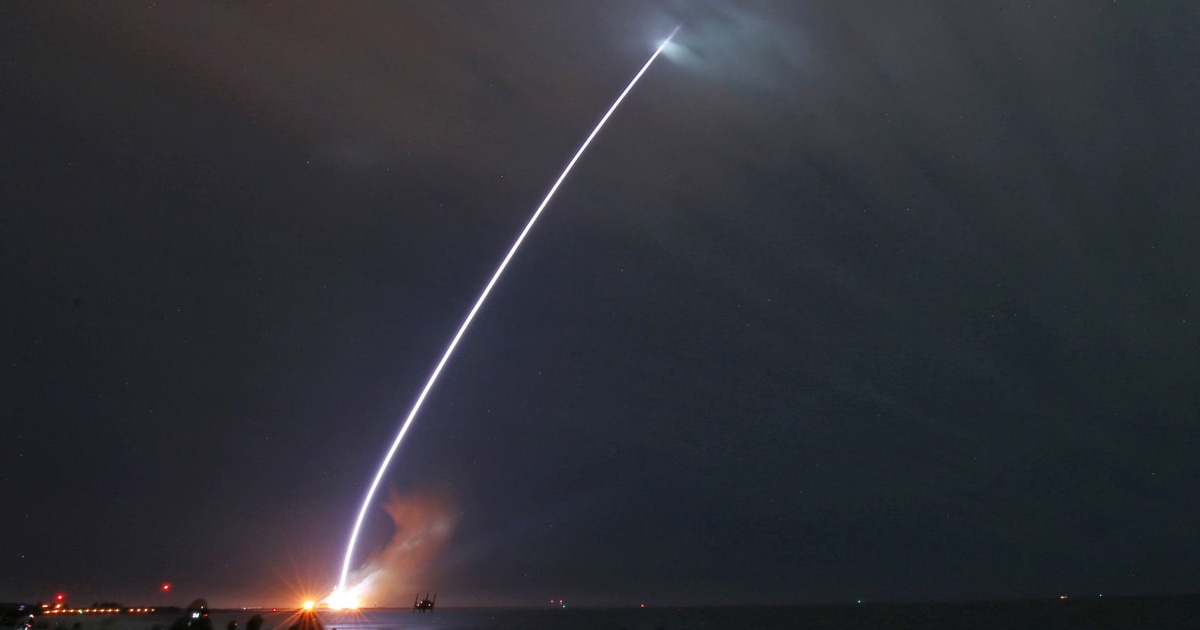Jeff Bezos’ New Glenn Rocket Soars: A New Era in Space Exploration Begins
In a groundbreaking event for the aerospace industry, Jeff Bezos’ New Glenn rocket successfully achieved orbit during its inaugural flight. This remarkable accomplishment not only highlights significant advancements in space technology but also marks a pivotal moment in the ongoing competition within the burgeoning space travel sector. As the New Glenn rocket soars into the cosmos, it signifies the dawn of a new era in space exploration, paving the way for future commercial missions and interstellar ambitions.
The Launch: A Milestone Achieved
The New Glenn rocket, named after the legendary astronaut John Glenn, was launched from Cape Canaveral, Florida. The launch was a culmination of years of meticulous planning and development by Bezos’ space company, Blue Origin. The rocket is designed to carry a variety of payloads into orbit, supporting both government and commercial missions. With a capacity to lift approximately 45 metric tons to low Earth orbit, the New Glenn is poised to compete with established players in the industry, such as SpaceX’s Falcon Heavy.
This launch was not just a technical victory; it was also a demonstration of the commitment and vision of Blue Origin to make space travel more accessible and sustainable. Bezos, who has long been an advocate for space exploration, envisions a future where millions of people can live and work in space. The successful flight of New Glenn is a giant leap toward realizing this ambitious vision.
Technological Innovations Behind New Glenn
One of the standout features of the New Glenn rocket is its reusability. Similar to SpaceX’s approach, Blue Origin has engineered the New Glenn to be recoverable, allowing the first stage of the rocket to land back on Earth for refurbishment and reuse. This innovative design is expected to significantly reduce the cost of access to space, making it more feasible for businesses and governments to launch satellites and conduct research.
Moreover, the New Glenn is powered by BE-4 engines, which are among the most advanced rocket engines currently in development. These engines utilize liquefied natural gas (LNG) and liquid oxygen, contributing to a cleaner footprint compared to traditional rocket fuels. This focus on sustainability aligns with global efforts to reduce the environmental impact of space launches.
The Competitive Landscape of Space Travel
The successful launch of the New Glenn rocket positions Blue Origin as a formidable contender in the competitive landscape of space travel. With major players like SpaceX, NASA, and other emerging companies vying for a stake in the new space economy, the landscape is rapidly evolving. Each company brings unique strengths and innovations to the table, and the introduction of New Glenn adds another layer of excitement to the race.
- SpaceX: Known for its reusable Falcon rockets and ambitious plans for Mars colonization.
- NASA: Continuing to lead in scientific research and deep-space exploration with its Artemis program.
- Virgin Galactic: Focusing on suborbital space tourism and the experience of space travel for civilians.
As more companies enter the fray, the competition will likely drive down costs, stimulate innovation, and broaden access to space. The implications of this shift are profound, opening up opportunities for new industries and advancements in technology.
Future Commercial Missions and Exploration
The successful flight of New Glenn not only augurs well for Blue Origin but also sets the stage for future commercial missions. With the increasing demand for satellite deployment, space research, and potential space tourism, the New Glenn rocket could become a vital asset for various stakeholders.
Blue Origin has already announced plans for several upcoming missions, including launching satellites for both government agencies and private companies. Furthermore, the rocket’s capabilities may one day support lunar missions and other deep-space explorations.
Additionally, the success of the New Glenn may inspire other companies to invest in similar technologies. The potential for partnerships and collaborations could lead to groundbreaking discoveries and advancements in space science.
Public Interest and Human Spaceflight
The excitement surrounding the New Glenn launch has also captured the public’s imagination. With Jeff Bezos at the helm, many are eager to see how Blue Origin will contribute to the dream of human spaceflight. Bezos has expressed his desire to not only make space travel more accessible but also to facilitate human settlement beyond Earth.
As the concept of space tourism gains traction, the successful launch of New Glenn could serve as a precursor to a future where everyday individuals can experience the wonders of space travel. Imagine the day when a family can book a trip to low Earth orbit, witnessing the curvature of our planet firsthand. The implications for education, inspiration, and scientific curiosity are vast.
Conclusion: A Bright Future Ahead
Jeff Bezos’ New Glenn rocket soaring into orbit marks a defining moment in the history of space exploration. This successful launch not only showcases advanced aerospace technology but also opens up a wealth of possibilities for commercial missions, scientific research, and even human spaceflight. As Blue Origin continues to innovate and expand its reach, the future of space exploration looks brighter than ever.
With the New Glenn rocket leading the charge, we stand on the brink of a new era in space travel—one that promises to redefine our relationship with the cosmos and inspire generations to reach for the stars.
See more Future Tech Daily

